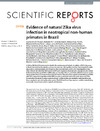Please use this identifier to cite or link to this item:
https://accedacris.ulpgc.es/jspui/handle/10553/45704
| Title: | Evidence of natural Zika virus infection in neotropical non-human primates in Brazil | Authors: | Terzian, Ana Carolina B. Zini, Nathalia Sacchetto, Lívia Rocha, Rebeca Froes Parra, Maisa Carla Pereira Del Sarto, Juliana Lemos Dias, Ana Carolina Fialho Coutinho, Felipe Rayra, Jéssica da Silva, Rafael Alves Costa, Vivian Vasconcelos Fernandes, Natália Coelho Couto De Azevedo Réssio, Rodrigo Diaz Delgado, Josue Guerra, Juliana Cunha, Mariana S. Catão-Dias, José Luiz Bittar, Cintia Reis, Andréia Francesli Negri Santos, Izalco Nuremberg Penha dos Ferreira, Andréia Cristina Marascalchi Cruz, Lilian Elisa Arão Antônio Rahal, Paula Ullmann, Leila Malossi, Camila Araújo, João Pessoa de Widen, Steven de Rezende, Izabela Maurício Mello, Érica Pacca, Carolina Colombelli Kroon, Erna Geessien Trindade, Giliane Drumond, Betânia Chiaravalloti-Neto, Francisco Vasilakis, Nikos Teixeira, Mauro M. Nogueira, Maurício Lacerda |
UNESCO Clasification: | 310911 Virología 240121 Primates |
Keywords: | Aedes Africa Animals Brazil Disease carrier, et al |
Issue Date: | 2018 | Journal: | Scientific Reports | Abstract: | In Africa, Old World Primates are involved in the maintenance of sylvatic circulation of ZIKV. However, in Brazil, the hosts for the sylvatic cycle remain unknown. We hypothesized that free-living NHPs might play a role in urban/periurban ZIKV dynamics, thus we undertook an NHP ZIKV investigation in two cities in Brazil. We identified ZIKV-positive NHPs and sequences obtained were phylogenetically related to the American lineage of ZIKV. Additionally, we inoculated four C. penicillata with ZIKV and our results demonstrated that marmosets had a sustained viremia. The natural and experimental infection of NHPs with ZIKV, support the hypothesis that NHPs may be a vertebrate host in the maintainance of ZIKV transmission/circulation in urban tropical settings. Further studies are needed to understand the role they may play in maintaining the urban cycle of the ZIKV and how they may be a conduit in establishing an enzootic transmission cycle in tropical Latin America. | URI: | https://accedacris.ulpgc.es/handle/10553/45704 | ISSN: | 2045-2322 | DOI: | 10.1038/s41598-018-34423-6 | Source: | Scientific Reports [ISSN 2045-2322], v. 8 (16034), p. 1-15 |
| Appears in Collections: | Artículos |
SCOPUSTM
Citations
76
checked on Jun 8, 2025
WEB OF SCIENCETM
Citations
56
checked on Jun 8, 2025
Page view(s)
146
checked on May 17, 2025
Download(s)
186
checked on May 17, 2025
Google ScholarTM
Check
Altmetric
Share
Export metadata
Items in accedaCRIS are protected by copyright, with all rights reserved, unless otherwise indicated.
